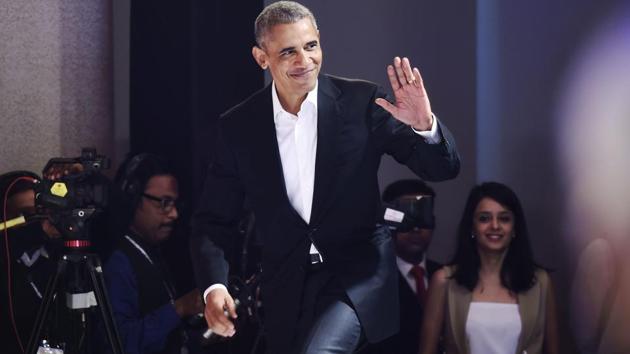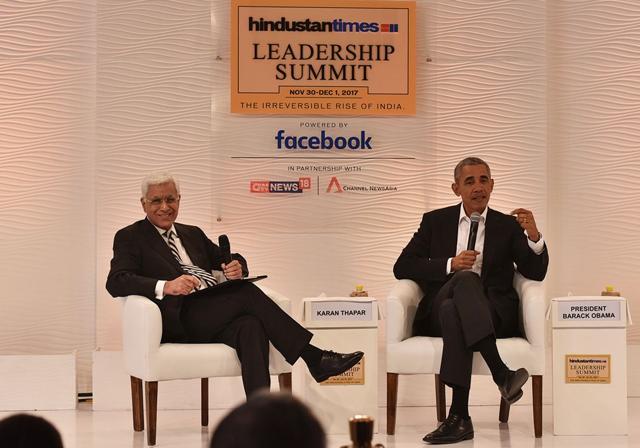HTLS 2017: Barack Obama says there’s no problem we can’t solve if India, US come together
On Day 2 of HT Leadership Summit, Barack Obama also said nations beyond India and the US need to work together.
There is no problem that can’t be solved if India and the United States work together, former US president Barack Obama said on Friday as he called for a more inclusive global order to address challenges such as inequality and terrorism.

The 44th US president unveiled a four-point agenda for the world order - tackling problems arising from the globalisation of economies, working multilaterally on issues such as climate change and terrorism, giving diplomacy its due for dealing with problems such as the North Korean nuclear crisis, and the right way of consuming information.
Arriving to a standing ovation from an exuberant audience at the 15th Hindustan Times Leadership Summit, Obama recalled his special fondness for fostering ties between the “world’s oldest and largest democracies” that he had described as the “defining partnership for the 21st century”.
“If India and the US are working together, I believe there is no problem we cannot solve,” Obama said, recalling how the two sides worked together to deal with tough issues such as the recovery of the world economy and the Paris climate deal.
“That’s one of the reasons why Prime Minister (Narendra) Modi and I met an unprecedented nine times, because all of the key challenges we face will be easier to achieve if India continues to play a larger role not just in the Asia-Pacific region but on the world stage,” he added.
Obama, who visited India twice as the US president, praised Modi and his predecessor Manmohan Singh, who was the first state guest during his second term, in equal measure during the hour-long interaction.
Both leaders were “engaged, honest and direct with me” and they took “tough decisions in order to help underwrite the international system”, he said.
“Dr Singh was the primary interlocutor with me when we were saving the country from a global finance meltdown. Prime Minister Modi was the primary partner in unlocking the Paris Accord. Neither of those things was easy and both required some political courage back here in India,” he said.
Obama said he likes Modi, who has a vision for India and is modernising elements of the bureaucracy. But he noted that he was “great friends” with Singh, who laid the “foundations for the modern Indian economy”. The unifying theme with both prime ministers was that strong US-India relations were important.
After explaining the inherent commonalities between the two sides, which include pluralism and constitutions that put “we the people” at the very beginning, Obama said successive governments in the two countries had nurtured bilateral ties.
He spoke about how the two countries also worked together on India’s bid to enter the Nuclear Suppliers Group, an exclusive club that controls trade in nuclear technology and materials, and in the aftermath of the 2008 Mumbai attacks that killed 166 people.

Obama also spoke of ways to address issues confronting the world and making it a better place. He called for harnessing high technology in a way that creates more jobs and addresses inequality while countering fears and worries created among some segments of society by the globalisation of the economy. Though many people had benefited, some felt globalisation and automation had weakened their position and resulted in job losses.
He warned against consuming information that only feeds one’s biases and causes people to “retreat into bubbles”, another facet of the technological explosion. Facts were being created to suit opinions instead of opinions being based on facts, he said, warning this could weaken the “grand experiment of democracy”.
“Invest in people. Skill them, educate them. Empower them to start their own business,” Obama said as he talked about the “unprecedented pace” of automation.
“We can’t pretend automation doesn’t exist, we can’t ignore globalisation. But we can invest in our people’s skills...We still need to do more to close the gap between rich and poor nations,” he said.
In the context of his successor Donald Trump dumping the Paris climate deal, which he had championed, and concerns about the US becoming increasingly isolationist, Obama spoke about countries working together for the larger common good, while understanding globalisation is here to stay.
“We have to work in multilateral fashions…I was very appreciative of the critical role India played and Prime Minister Modi played in forging the Paris accord to fight climate change…And it’s an agreement even though we have a little bit of a pause in American leadership…, ” he said.
Touching on the challenges of terrorism, the Nobel Peace Prize winner spoke about the need to reach out to people and countries through diplomacy against the backdrop of growing tensions between the US and North Korea as well as the fight against Islamist terrorism in the Middle East and elsewhere.
“We can’t rely only on military and weaponry to solve problems,” he said, while calling on people to overcome “fear and despair and build a circle of hope”.
“America and India are alike, being defined by many different languages, dialects genders and orientations…every caste, colour and creed,” he said. “Our history together speaks about a common set of values - pluralism and tolerance, a liberal market based order that places primacy on individual rights,” he added.





